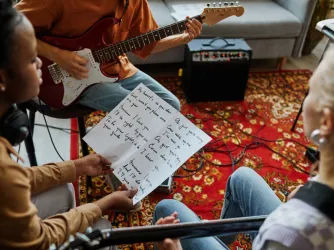Table of Contents
Students absolved of both criminal charges and school sanctions after Ohio University protest

In a free speech victory, Ohio University students arrested last month for protesting in the school's Baker University Center rotunda will not face further criminal prosecution or be subject to school sanctions.
The string of announcements came after Michael Mayberry, a student arrested for his participation in the Feb. 1 protest, was found not guilty of criminal trespass charges Monday in a decision his attorney called “a win for free speech.”
On Wednesday, the city prosecutor's office dropped criminal charges against 54 other protesters arrested in the incident. Then, just yesterday, OU announced that it would “not proceed with any disciplinary action against anyone in connection with the [protest.]”
Mayberry gathered with an estimated 200-250 protesters last month in the rotunda to demonstrate against President Donald Trump’s first executive order on immigration and to encourage the university to become a “sanctuary campus.” After Ohio University Police Chief Andrew Powers arrived on the scene and announced that all individuals remaining in the rotunda would be arrested for criminal trespass, Mayberry and 69 others stayed put, and were subsequently arrested and charged.
In making his ruling, Athens Municipal Court Judge Todd Grace first performed a forum analysis of the rotunda to determine the public university’s power to limit speech in that particular location. Simply put, courts conducting forum analysis classify locations in three categories: “traditional public forums” (government property traditionally devoted to public assembly), “designated public forums” (government property that has been opened to the public for assembly), and “nonpublic forums” (government property that has not been opened to the public for assembly). Content-based regulations of speech in traditional and designated public forums are subject to “strict scrutiny,” and may only prevent speech if necessary to serve a “compelling state interest,” and only if the exclusion is “narrowly drawn to achieve that interest.” Content-neutral regulations in public forums must be “narrowly tailored” to achieve a “significant state interest.”
In order to determine which type of forum the rotunda falls into, Grace looked to the history of the building and its use. He explained that in 2014, a protest that included about 100-150 people (including Mayberry, in fact) was held in the rotunda in response to events in Ferguson, Missouri. That protest was permitted to proceed, and university administration even kept the building open past normal hours to let the protest continue. As a result, Grace determined that, because the university has opened the rotunda up for public assembly in the past, the rotunda constitutes to be a designated public forum. This means that the government had to show in this case that there was a significant state interest to force protesters like Mayberry to leave the rotunda during the Feb. 1 protest.
After making the forum determination, Grace then evaluated the three reasons police provided for shutting down the protest, and rejected each one. First, Grace explained that there was insufficient evidence to prove noise from the protest created a disturbance to other activities in the Baker Center. Second, he rejected the claim that a mere concern about potential violence was sufficient. Citing 1969’s Tinker v. Des Moines Independent School District, a Supreme Court case involving student speech at a high school, he explained that there was “no evidence of actual violence presented” at the protest, and that “fear or apprehension of a disturbance is not enough to overcome the right to freedom of expression on a college campus.” Last, he found concerns about protesters blocking pathways for pedestrians to pass through the rotunda unsubstantiated, as video footage showed pedestrians — and even a pizza delivery person delivering pizzas — roaming freely around the protestors.
For these reasons, the judge held that Mayberry engaged in constitutionally protected speech and could therefore not be found guilty under the criminal trespass statute.
Before learning that the charges against the students would be dropped and before OU announced it also would not pursue sanctions, university Interim President David Descutner said the university supported dropping the charges and was drafting an updated policy that “protects the first amendment (sic) rights of all but also is consistent with the court’s ruling and with the values of Ohio University.”
As the university's current “Use of Outdoor Space on the Athens Campus” policy earns FIRE’s highest, “green light” rating, FIRE hopes future assembly policies will be similarly protective of students’ rights. As always, FIRE stands ready to assist with drafts and revisions of such policies.
Recent Articles
Get the latest free speech news and analysis from FIRE.

LAWSUIT: FIRE challenges unconstitutional provisions Rubio uses in crusade to deport legal immigrants over protected speech


Fiction is not a felony
